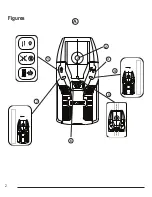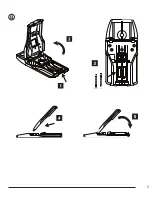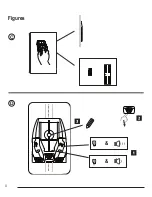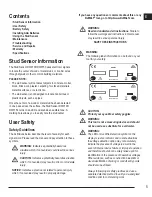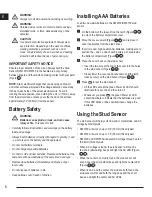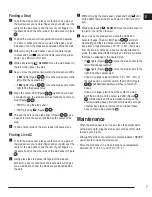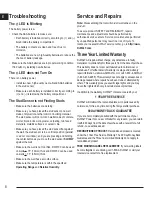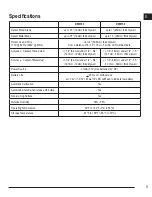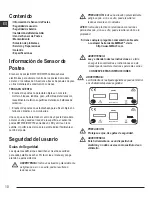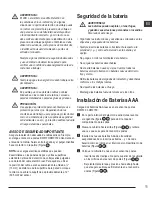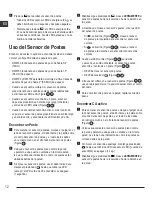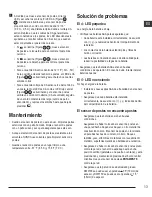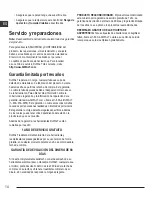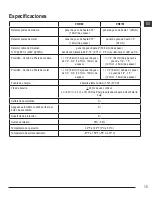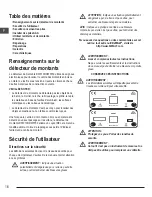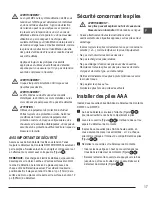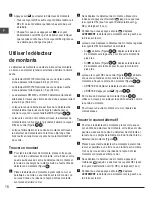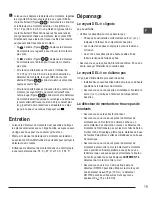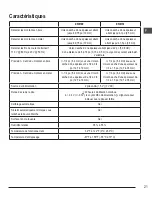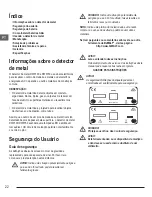
7
E
Finding a Stud
1.
To hold the stud sensor, place your thumb on one side of
the stud sensor, your pointer finger and your palm over the
center of the stud sensor, and the rest of your fingers on
the same hand on the other side of the stud sensor (Figure
C
).
2.
Position the stud sensor flat against the wall and parallel
to a door or window on the same wall, which give you an
indication of how the studs are positioned behind the wall.
3.
Without moving the stud sensor, use your pointer finger
to press and hold until all the LEDs (except the green
Power LED) turn off (1 sec).
4.
While still pressing , SLOWLY move the stud sensor to
the left or the right on the wall.
5.
As you move the stud sensor, watch the stud sensor LEDs.
• If
lights (Figure
A
7
), move the stud sensor to the
left to find the nearest stud.
• If
lights (Figure
A
4
), move the stud sensor to the
right to find the nearest stud.
6.
When the center LED (Figure
A
5
) lights and you hear
a constant beep, the stud sensor has found the center of a
stud (Figure
D
1
).
• STOP moving the stud sensor.
• STOP pressing (Figure
D
2
).
7.
Through the hole on the stud sensor (Figure
D
3
), use
a pencil to mark the current position as the center of the
stud.
8.
To find another stud on the wall, repeat the same steps.
Finding Live AC
1.
To hold the stud sensor, place your thumb on one side of
the stud sensor, your pointer finger and your palm over the
center of the stud sensor, and the rest of your fingers on
the same hand on the other side of the stud sensor (Figure
C
).
2.
Gently place the stud sensor flat against the wall and
parallel to a door or window on the same wall, which give
you an indication of how the studs are positioned behind
the wall.
3.
Without moving the stud sensor, press and hold until
all the LEDs (except the green Power LED) turn off (1
sec).
4.
While still pressing , SLOWLY move the stud sensor to
the left or the right on the wall.
5.
As you move the stud sensor, watch the LEDs and
listen for beeps. The AC LED (Figure
A
3
) will start
illuminating and the stud sensor will sound a cadenced
beep from a typical distance of 6”-18” (.15m - .5m) away
from the live AC. Since AC wires are usually attached to
studs, the directional LEDs will help you find live AC wires
that may be attached to the nearest stud.
• If
lights (Figure
A
7
), move the stud sensor to the
left to find the nearest stud.
• If
lights (Figure
A
4
), move the stud sensor to the
right to find the nearest stud.
• If live AC voltage is found within 6”-18” (.15m - .5m) of
the stud sensor’s current position, the AC LED (Figure
A
3
) will illuminate and you will hear a few short
beeps.
• If live AC voltage is found near the center of a stud,
both the AC LED and the center red LED (Figure
A
5
) will illuminate and the stud sensor will sound the
short alternating beeps (AC found) followed by a longer
constant beep (stud center found), and repeat these
beeps until you stop pressing .
Maintenance
• When the stud sensor is not in use, clean the exterior parts
with a damp cloth, wipe the stud sensor with a soft dry cloth
to make sure it is dry,.
• Although the stud sensor exterior is solvent resistant, NEVER
use solvents to clean the stud sensor.
• Store the stud sensor in a clean location at a temperature
between -67 ˚F (-55 ˚C) and 158 ˚F (70 ˚C).


